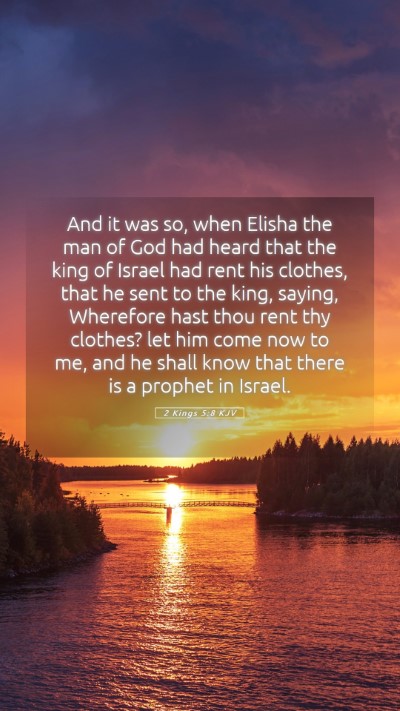Bible Verse Meaning: 2 Kings 5:8
Verse Context: 2 Kings 5:8 states, "So it was, when Elisha the man of God heard that the king of Israel had torn his clothes, that he sent to the king, saying, 'Why have you torn your clothes? Please let him come to me, and he shall know that there is a prophet in Israel.'"
This verse unfolds a significant event in the life of Naaman, a commander of the Syrian army who suffered from leprosy, and Elisha, the prophet of God. The response of both the king of Israel and Elisha highlights themes of faith, healing, and divine intervention.
Summary of Interpretations
- Elisha's Role: Commentators emphasize Elisha's position as a prophet of God. His readiness to help demonstrates the grace of God in providing a way for healing and understanding to those outside His covenant people.
- The King's Distress: The king of Israel's tearing of clothes reflects despair. Matthew Henry remarks on the king's lack of faith and understanding of God's capabilities, highlighting a contrast with Elisha's confident faith.
- Call to Naaman: Elisha’s instruction for Naaman to come to him reveals God's desire for all, even Gentiles, to know His power. This foreshadows the inclusion of the Gentiles in God's plan of salvation.
Insights from Public Domain Commentaries
Matthew Henry's Commentary
Henry outlines how the king of Israel's reaction signifies a misunderstanding of God's purposes. By tearing his clothes, the king displayed his hopelessness rather than turning to God for help. Elisha, in contrast, demonstrates confidence in God's will and seeks to provide Naaman with understanding about Israel's God, emphasizing the prophetic call to lead others to faith.
Albert Barnes' Notes
Barnes notes the significance of Elisha's directive to the king, as it communicates a chance for Naaman to witness the authentic power of a prophet—a vital aspect of understanding the Old Testament's prophetic ministry. The verse encapsulates the transition from Israel’s reliance on ritual to a deeper reliance on God's mercy and power.
Adam Clarke's Commentary
Clarke elaborates on the societal implications of Naaman's visit to Elisha. His high status as a Syrian commander and his affliction with leprosy called for a dramatic intersection of social and spiritual realms. Clarke highlights that Elisha serves not only as a healer but as a beacon of hope, showcasing God's willingness to extend His mercy beyond Israel.
Historical Context
Understanding the historical setting is crucial for interpreting this verse. During this period, Israel faced frequent conflicts with Syria. Naaman's position as a foreign commander and his leprosy present a unique opportunity for Elisha's ministry to shine a light on God's sovereignty over nations, thus illustrating the universal nature of God's grace.
Applications to Daily Life
This verse encourages believers to consider their role in pointing others to the character of God, similar to how Elisha guided Naaman. It teaches the importance of faith in God's timing and methods, especially in times of despair or confusion. The promptness with which Elisha addresses the situation provides a model for responding to crises with faith and proactive assistance.
Significance of the Verse
2 Kings 5:8 articulates the tension between despair and faith, highlighting the transformational impact an encounter with God can have in a person's life. It serves as a reminder that healing and restoration are available through humility and faith in God's word.
Cross References
- 2 Kings 4:27
- Isaiah 53:5
- Luke 4:27
Conclusion
In conclusion, 2 Kings 5:8 not only narrates an event in the Old Testament but also delivers enduring messages about faith, healing, and God's accessibility to all. This verse serves as a catalyst for believers in understanding scripture and its application in the modern world.


